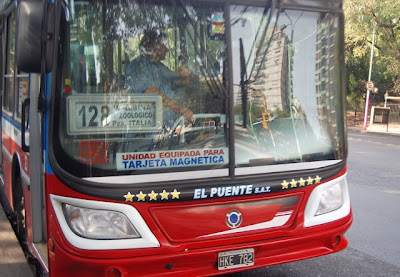It’s been slow to take effect – a similar Monedero card for the Subte has seen
limited acceptance – but after years of
dithering, Argentina’s federal government has finally forced the issue. With
fares going up on all three systems, the Secretaría
de Transporte (Transport Secretariat) recently decreed that, to continue to
take advantage of current transport subsidies, riders must obtain or apply for
a SUBE card by Friday, February 10. Current Monedero cards will not be eligible
for the subsidized rates (the new rates are not yet completely clear).
As my friend Nicolás Kugler has written me, “We have a problem for every solution.” The
SUBE card has meant blocks-long lines at the various centers where patrons can
obtain them: “Long queues can be seen
nowadays at every post office, kiosk, street stand, or parked bus where the
SUBE sign is displayed” (The Secretariat even had to open a center in Mar del Plata, where so
many Porteños spend their summer vacations).
Given the time-consuming difficulty of getting a card, which
is free of charge, the agency opened a website where riders can request one
electronically and receive it in the mail (presuming the post office operates
more efficiently than the Transport Secretariat does). Riders must submit their
name, address and DNI (national identity card) or other form of ID in order to
obtain it.
Given that my wife (an Argentine) and I are currently in
California – we’ll be flying to Buenos
Aires next week – we decided to apply on line. My wife’s application
apparently went smoothly, and her card should appear at our Palermo
address shortly, but mine was a different matter. Two days after filling out my
application, in which I included my passport number, I received the following
email notice: “We regret to inform you that your web request for the SUBE card
has been refused for inconsistencies in the personal data of the applicant. To
obtain your SUBE, you should visit one of the 600 service centers listed in our
web site. This notice has been sent automatically. It is unnecessary to respond
to this message.”
So, it seems, non-resident foreigners are not eligible for
the SUBE card which, on the face of it, appears tied to each individual’s
identity card. That, however, raises the (admittedly unlikely) specter of
station attendants and bus drivers checking each rider’s ID to assure that
nobody was using another’s SUBE card. In practice, though I might not be able
to get my own card, I expect to be able to use my wife’s, as I’m usually in
town more often than she is. In fact, even when we’re traveling together,
there’s no obstacle in using the same Subte ticket by just passing it back
across the turnstile (no ticket is necessary to exit the system).
SUBE is an interesting acronym because, in standard Spanish,
the word sube (infinitive subir) is a clever pun in that it means “climb
aboard” in the second person familiar. It’s not quite correct in the Argentine context,
though, because of slightly different verb forms: Argentines would say subí (in
the second person familiar), while suba would be the second person formal
version in both Argentine and standard Spanish.
Critics of the plan, though, have a different interpretation
of the acronym. They note that, when users top up their cards, they are in
effect providing the government an interest-free loan – critics might say “slush
fund” - that could total up to 500 million pesos (about US$125 million).
According to them, it should stand for “Somos
Unos Boludos Enormes,” roughly translatable as “We’re a bunch of enormous
dorks” for putting up with a bureaucratic maneuver that they see as a money
grab.
I’m not quite that critical. While I think SUBE’s implementation
is clumsily bureaucratic, something was necessary to integrate the system and, in the long run, it should be a positive. The issue of simply obtaining change
aside, it will also mean greater safety because bus drivers, who have been
vulnerable to robberies in some of Buenos Aires’s more dubious suburbs, will
not have to carry any cash.
An etymological digression: the slang word boludo has
off-color origins but, in today’s Argentina, it’s more innocuous than it once
was – you can call a friend boludo or bolú, and I’ve even seen it in humorous
TV advertisements. It is inappropriate in formal Spanish, though, and if you address a stranger as boludo, "Them could be
fightin' words."
Win a Prize from Southern Cone Travel!
I am still waiting on a winner or two from the contest from Saturday on the entry immediately below this one. Please have a look and enter, or I'll have to withdraw the remaining prizes.
Win a Prize from Southern Cone Travel!
I am still waiting on a winner or two from the contest from Saturday on the entry immediately below this one. Please have a look and enter, or I'll have to withdraw the remaining prizes.



No comments:
Post a Comment